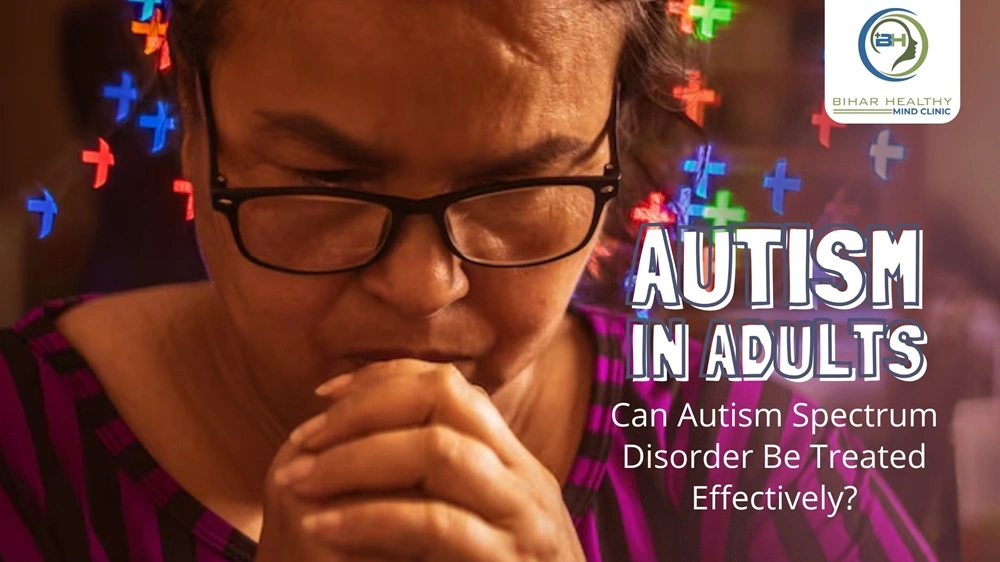
Autism Spectrum Disorder (ASD) is often associated with children, but it’s important to recognize that autism in adults is far more prevalent than many people realize. Thousands of individuals enter adulthood without ever receiving a formal diagnosis, silently struggling to make sense of their emotional, social, and sensory differences.
At Patna Psychiatry, under the supervision of Dr. Saurabh Kumar, MD (Psychiatry), widely regarded as the best psychiatrist in Patna, adults on the spectrum are provided with accurate diagnosis, compassionate care, and personalized treatment that promotes self-understanding and a better quality of life.
What is Autism Spectrum Disorder in Adults?
Autism Spectrum Disorder in adults refers to a lifelong neurodevelopmental condition that affects communication, social interaction, and behavior. The term “spectrum” reflects the wide range of challenges and abilities individuals experience. Some adults may lead independent lives, while others may need more consistent support to navigate daily activities.
Adults with undiagnosed autism may have faced years of social misunderstandings, career struggles, or emotional burnout, often attributing their difficulties to anxiety or introversion rather than autism itself. Receiving a diagnosis later in life can bring both clarity and emotional relief.
Common Autism Spectrum Disorder Symptoms in Adults
-
The autism spectrum disorder symptoms in adults are diverse, but commonly include:
- Social Interaction Challenges: Difficulty interpreting non-verbal cues, gestures, facial expressions, or maintaining small talk.
- Repetitive Patterns or Routines: Preference for predictable schedules, and discomfort with sudden changes.
- Sensory Differences: Sensitivity to bright lights, loud noises, textures, or certain smells.
- Focused Interests: Deep, intense concentration on specific hobbies or academic fields.
- Emotional Regulation Issues: Difficulty managing stress, anger, or anxiety in complex social situations.
- Communication Style Differences: Speaking in a monotone, avoiding eye contact, or taking things literally.
Many of these symptoms overlap with other psychiatric conditions, such as anxiety or OCD, which is why accurate diagnosis from a specialist like Dr. Saurabh Kumar is crucial.
Causes and Risk Factors of Autism in Adults
The root cause of autism lies in neurobiological development - specifically, how the brain processes information. Scientists believe a combination of genetic predispositions, environmental influences, and developmental factors contribute to autism.
-
Key risk factors include:
- Genetic mutations or family history of ASD
- Premature birth or low birth weight
- Advanced parental age during conception
- Neurological conditions affecting brain connectivity
Importantly, autism is not caused by parenting, upbringing, or emotional trauma. It’s a biological condition, not a behavioral one, and understanding this distinction helps eliminate social stigma.
Diagnosis of Autism Spectrum Disorder in Adults
Diagnosing autism in adults can be complex, as symptoms often blend with learned coping strategies. Many adults have developed ways to “mask” their challenges, imitating social behaviors to fit in, which makes diagnosis more difficult.
-
At Patna Psychiatry, the diagnostic process involves:
- Clinical Interview: Understanding developmental history, social patterns, and emotional challenges.
- Standardized Testing: Tools like the Autism Spectrum Quotient (AQ) or ADOS (Autism Diagnostic Observation Schedule).
- Collateral Input: Gathering observations from family or close friends.
- Co-occurring Condition Assessment: Screening for anxiety, ADHD, or depression.
Receiving a diagnosis allows adults to better understand themselves, make informed decisions, and seek therapy that fits their individual needs.
Treatment and Support for Autism Spectrum Disorder in Adults
While autism spectrum disorder in adults cannot be completely cured, early and consistent therapy can significantly improve emotional regulation, communication, and daily functioning. The aim is to empower individuals to live fulfilling and independent lives.
-
At Patna Psychiatry, treatment programs are holistic and include:
- Cognitive Behavioral Therapy (CBT): Helps identify negative thinking patterns and improves problem-solving, emotional control, and adaptive behavior.
- Social Skills Training: Focuses on body language, active listening, and conflict resolution, allowing adults to build stronger relationships.
- Occupational and Sensory Therapy: Assists individuals in managing sensory overload and improving focus at work or in daily routines.
- Vocational Counseling: Encourages autistic adults to explore careers that align with their strengths, creativity, and focus.
- Medication Management: Though no medication treats autism itself, psychiatric support can address symptoms like anxiety, depression, or irritability.
- Family and Partner Education: Psychoeducation helps families understand autism’s nuances and creates a more accepting and supportive environment at home.
Long-Term Management and Lifestyle Tips
Living with autism in adults is not about curing the condition, but optimizing one’s environment, mindset, and support systems.
-
Practical strategies include:
- Establishing structured daily routines
- Practicing mindfulness and relaxation exercises
- Setting clear boundaries to reduce sensory stress
- Joining autism support groups or therapy circles
- Using assistive tools like planners, reminders, and apps for social communication
Autistic adults often thrive when they embrace their differences and develop strategies to balance their strengths with daily life challenges.
The Role of Family and Society
Family understanding plays a central role in helping autistic adults thrive. Recognizing and respecting their unique ways of communication, avoiding judgment, and creating calm spaces can make a world of difference.
Employers and colleagues also contribute by promoting inclusivity, offering flexible workspaces, sensory-friendly environments, and clear communication channels.
Society benefits immensely when it learns to see autism not as a disorder, but as a different form of intelligence and perception.
Why Choose Patna Psychiatry for Autism Treatment?
Patna Psychiatry, headed by Dr. Saurabh Kumar, MD (Psychiatry), provides comprehensive evaluation and evidence-based treatment for adults with autism. The clinic combines modern diagnostic methods with personalized therapy plans, focusing on emotional balance, improved communication, and mental well-being.
Dr. Kumar’s approach integrates compassion, clinical precision, and patient empowerment, making Patna Psychiatry one of the most trusted mental health centers in Bihar.
If you or a loved one is experiencing autism spectrum disorder symptoms in adults, reach out today for a confidential consultation with the best psychiatrist in Patna.
Visitors: 54





No comments yet.